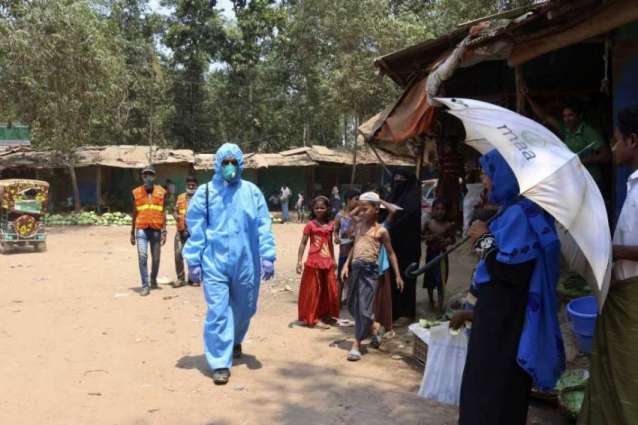Thirty-eight cases of the COVID-19 lung disease have been registered among the Rohingya refugee population in the Cox's Bazar district of Bangladesh so far, but the current data does not suggest community transmission yet, Catalin Bercaru, communication officer for the World Health Organization (WHO) country office in Bangladesh, told Sputnik
MOSCOW (Pakistan Point News / Sputnik - 16th June, 2020) Thirty-eight cases of the COVID-19 lung disease have been registered among the Rohingya refugee population in the Cox's Bazar district of Bangladesh so far, but the current data does not suggest community transmission yet, Catalin Bercaru, communication officer for the World Health Organization (WHO) country office in Bangladesh, told Sputnik.
Bangladesh, the most densely populated country in the world, also hosts the world's largest refugee camp near Cox's Bazar. A month ago, local officials reported the first COVID-19 cases among Rohingya refugees.
"To date there are 1,481 confirmed cases in the Cox's Bazar district and 38 confirmed cases among Rohingya population," Bercaru said.
According to the WHO spokesperson, the existing data does not indicate that there is community transmission of the disease, but the UN health agency and its partners are taking every effort to limit the spread of the deadly virus in the refugee camps.
"However, the very crowded conditions from the Rohingya communities are a major challenge in identifying all the cases, topped up by the characteristics of COVID-19 that infected people can show only mild symptoms or no symptoms at all, making their early identification very difficult," Bercaru said.
According to the communication officer, the testing capacity for Rohingya refugees and the host population has been ramped up to 500 tests per day and there are plans to soon increase it to 700. To this end, WHO has provided a polymerase chain reaction (PCR) machine for testing and additional trained personnel, Bercaru said.
According to the spokesperson, the health capacity in the refugee camps are currently meeting the current needs for addressing the COVID-19 threat, and there are plans to prepare 1,900 beds for treating and isolating cases and an intensive care unit with 10 beds in a local hospital.
"However, if the number of cases will abruptly increase, the health capacity which was already under pressure even before COVID-19 crisis, will be even more challenged and facing large number of patients will be increasingly difficult," Bercaru stressed.
While ensuring continuity of essential health care services, it is also crucial for WHO to maintain the gains in "health seeking behaviours" of refugees, the spokesperson noted.
"At this moment we have already observed a decline in accessing essential health services by the Rohingya population and a lower number of outpatient consultations reported from the camps in comparison with the same period in 2019. Therefore, WHO and the health partners are putting a lot of efforts to maintain the essential health services while scaling up the response against COVID-19," Bercaru said.
As of late April, about 860,000 refugees live in Cox's Bazar, most of whom are ethnic Rohingya Muslims forced to flee their homes in neighboring Myanmar amid an army offensive in August 2017. The Myanmar authorities launched an unprecedented violence campaign against the Rohingya after militants, allegedly from this minority group, carried out attacks on police posts in the country's north-western state of Rakhine.
A UN fact-finding mission to the country in 2018 said that there were grounds to charge Myanmar with crimes against humanity and genocide against the Rohingya people. In January, the International Court of Justice ruled that Myanmar must fully implement all measures to prevent the murder, torture or persecution of people based on racial, ethnic or religious grounds.




